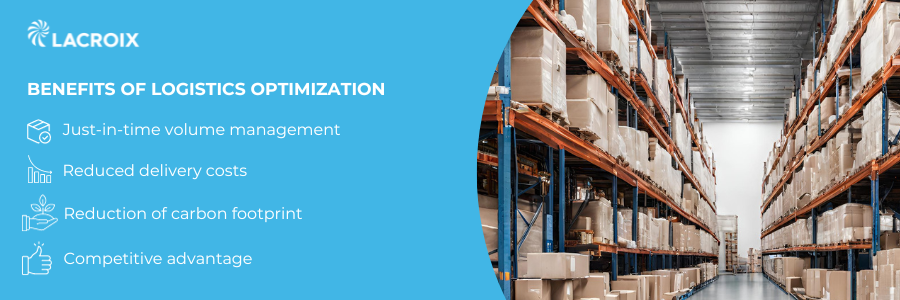29 November 2023
LACROIX Electronics
5 min de lecture
While producing abroad has long been the preferred strategy of the biggest industrial companies, relocation to neighboring countries is replacing the dominant model. Faced with geopolitical tensions and the risks of stock shortages, nearshoring is becoming increasingly strategic to produce better at a roughly equivalent total acquisition cost. What if this new shift allowed us to strengthen our agility and resilience in a constantly fluctuating environment?
🔎 According to a survey carried out by BCI Global, 60% of American and European companies wish to repatriate certain production previously located in Asia. [1]
🌍 #Reason 1 : Benefit from geographical and cultural proximity
Companies engaged in relocation in foreign territories have already observed that time zone differences complicate the remote management of multicultural teams and slow down the production and logistics chain.
Bringing production sites closer to consumer markets offers several advantages in this regard. In addition to reducing all distances, it also facilitates the work of teams. Their cultural proximity and synchronized working hours make exchanges easier and smoother, promoting the effective coordination of their operations and better communication among them.
This geographical proximity is also an asset for the competitiveness of your production. Choosing a nearshore outsourcing strategy not only improves the efficiency and productivity of your teams but also optimizes the functioning of your Supply Chain.
Finally, proximity to production provides better quality control. By reducing the distance between manufacturing processes and your quality teams, you can detect and correct problems faster.

📦 #Reason 2 : Optimize logistics – reduce delivery times and gain flexibility in inventory management
Indeed, to the extent that the distances to be traveled between customers and suppliers are shorter, shipping times are generally shorter. This responsiveness allows companies to develop better adaptation to market developments.
They adjust the volume of their production to actual needs, thus optimizing their inventory management and the usually associated costs.
Relocating your electronic production close to the target market generates a significant reduction in delivery times, offering an undeniable competitive advantage.
🔎According to a Deloitte survey, 88% of companies consider proximity to production as a key factor in improving the flexibility of their operations.

📜 #Reason 3 : Limit compliance risks related to transport and logistics
The transport sector is subject to numerous legislative constraints. Despite constant regulatory changes, this control of compliance risks has the effect of simplifying all transport and logistics procedures and thus improving global costs.
By bringing production closer to main markets, companies have better knowledge and understanding of the standards in force to apply. For example, if you choose to relocate your activities to a member country of the European Union, all your procedures will be facilitated and customs duties avoided, thanks to free trade agreements.

💡 Secure your production transfer
Getting started with nearshoring an existing product may seem risky to you. To maximize your chances of successfully transferring production from one subcontractor to another, we advise you to validate the industrialization capabilities of your new partner. This is real know-how that not all EMS masters.
The industrialization service makes your product more reliable by improving manufacturability, testability and securing the supply chain.
Grâce à cette expertise et à leur expérience, vous bénéficiez d’un soutien précieux pour relever les défis associés au changement de lieu de production. Cette démarche apporte une réelle valeur ajoutée aux entreprises qui cherchent à optimiser leur production électronique à l’échelle internationale.
… Soon the end of relocation abroad ?
Long popular, relocation abroad is revealing more and more hidden costs, starting with expensive transport costs, due to the constant rise in the price of oil.
By reducing the distances traveled by raw materials and semi-finished and finished products, companies can achieve very significant transport savings. In addition, by choosing a less energy-intensive and more sustainable production model, managers have also found a particularly effective solution for developing their CSR strategy by reducing their carbon emissions.
Beyond limiting the impact generated by the transport of your equipment, products and goods, the repatriation of production allows you to create new job opportunities locally.
[1] Source: BCI Global, “Logistics relocation study in EMEA: new emerging markets” – 2022
[2] Source: Deloitte, “Manufacturing Competitiveness: 2019 and Beyound” – 2019
Plus d'articles

Explained
Relocating your electronics production to Tunisia: the advantages you need to know

Expert's take
What is EV Charging?

Explained
Revolutionizing Smart Cities with AIoT: LACROIX and STMicroelectronics Unveil Innovative EdgeAI Technology powered by AWS re:Invent 2023

Explained
3 good reasons to relocate your electronic production close to your customers

Explained
Electric mobility and green hydrogen for a sustainable future

Explained
Lean Management 4.0 has come to LACROIX!

Explained
The Digitalization of Technical Documentation: Tested and Approved by LACROIX!

Explained
How 5G is revolutionizing the industry of the future?

Explained
LACROIX acquires the american EMS Firstronic

Explained

